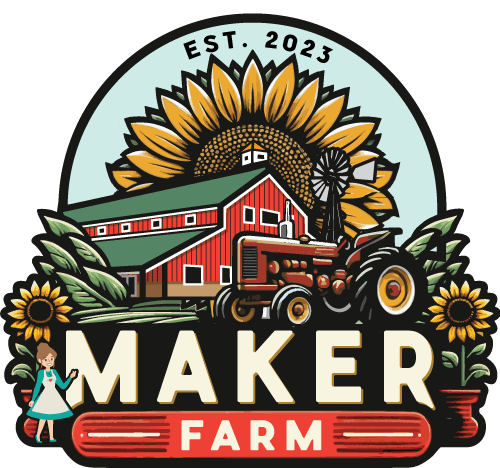Is Clover Safe For Dogs? What if a Dog Eats Clover?
One of our first tasks at Maker Farm is to clear some space for a sort of base camp. But once we clear space, weeds will grow right back if we don’t get a ground cover down right away. So we’re considering clover as a new ground cover! So one of our first questions as dog owners was, “Is clover safe for our furry friends?” Clover is a common sight in many lawns and gardens. As dog owners, we’re always concerned about what our pets consume, especially when it comes to plant material they might find tasty.
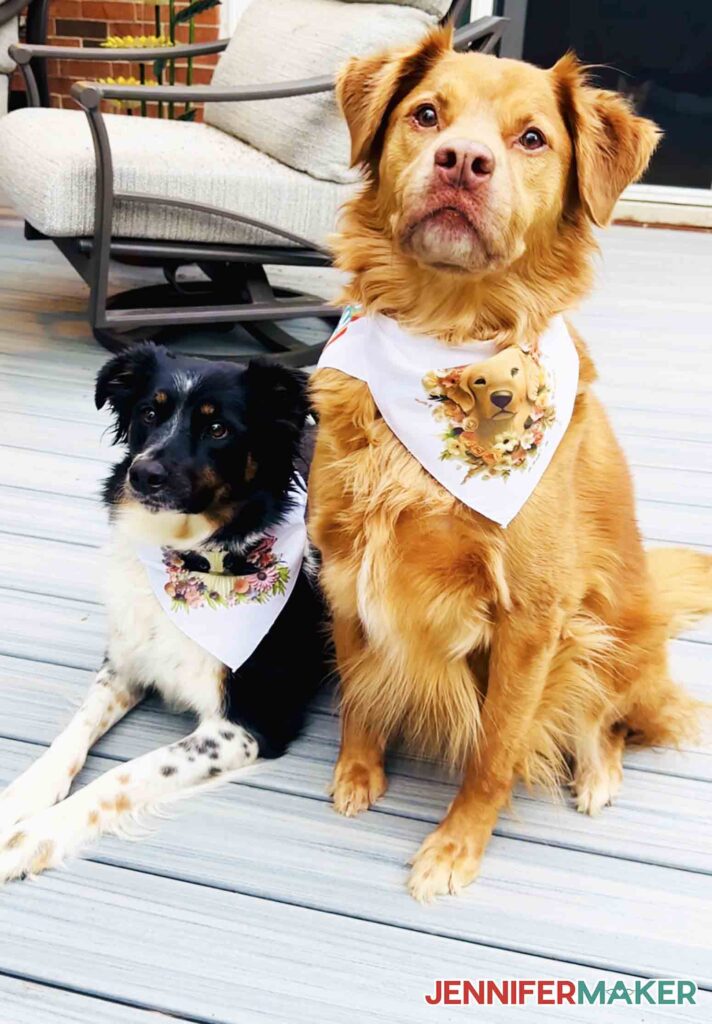
Both of our dogs Hunter and Chloe love to eat the grass in our current lawn at home. So, to satisfy ourselves, we dove deep into clover and pet safety and want to share our findings with you! In this comprehensive guide, we’ll explore whether clover a lawn is a good option for a dog, the effects of large amounts, and what to do if your dog ingests this common type of clover. (By the way, if you our furry friends’ fashionable bandanas, you can learn how to make pet bandanas here.)
This post contains some affiliate links for your convenience (which means if you make a purchase after clicking a link I will earn a small commission).
Is Clover Safe for Dogs?
What is Clover?
Clover is part of the trifolium pratense family, with over 300 species of clover. It’s a low maintenance, dense ground cover that often thrives in full sun. But is it safe for dogs? That’s the big question we set out to answer.
Clover can be identified by it’s three small, petal-shaped leaves. Here is a white clover leaf from our yard at home.
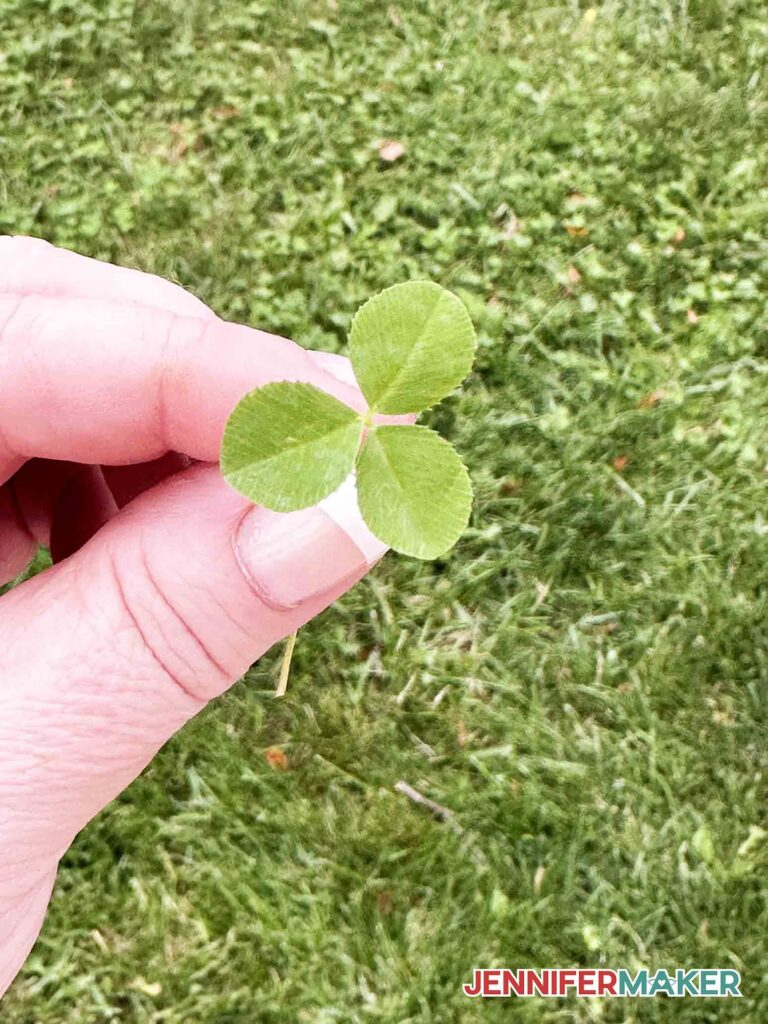
Types of Clover
CommonTypes of Clover
From red clover to European white clover and micro clover, there are numerous types to consider. Some are used as livestock feed, while others may have medicinal benefits.
Red clover is quite tall (up to sux feet tall) and we would not want our dogs tramping about in it, so we would not recommend that for a dog yard. White clover is very common and only grows about six inches tall. But we’re actually considering using microclover, also known as miniclover, as a ground cover because it doesn’t grow that high (usually only four inches tall) and does not need as much mowing.
Some of the disadvantages to a microclover lawn are that it isn’t as heat tolerant as a regular clover lawn, nor will it stand up to heavy foot traffic as well, but neither of these are big concerns for our ground cover.
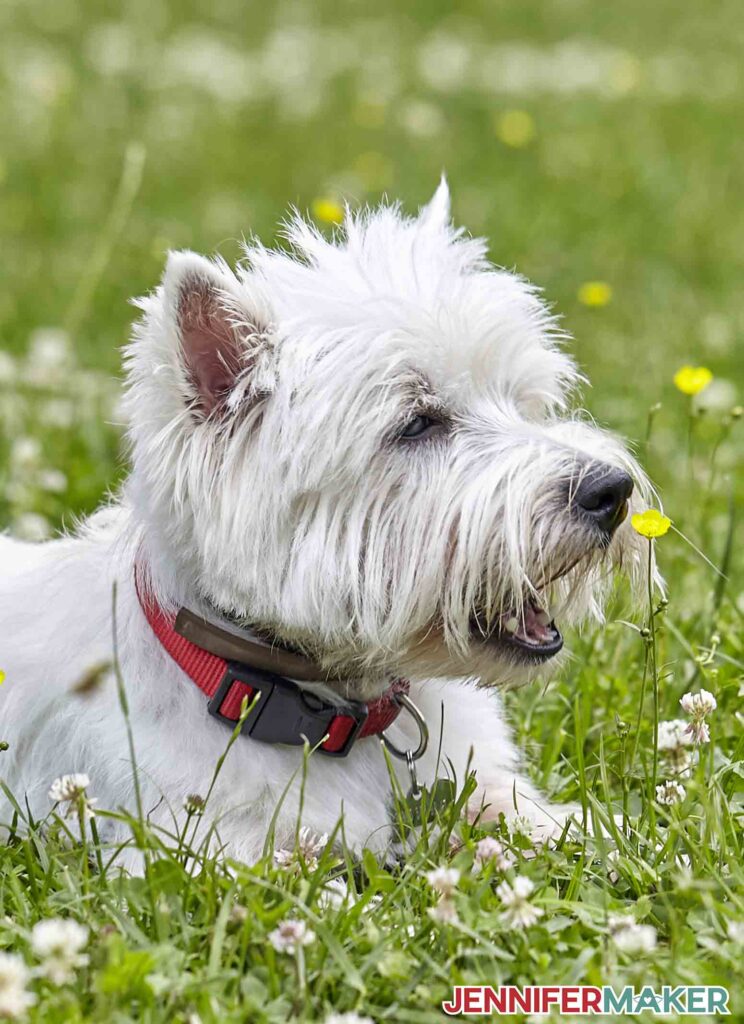
Types of Edible Clover
Clovers like dutch clover are considered a great option as they’re edible and might be seen as a tasty treat for your dog. Dutch clover is really just white clover, but on the larger side of things. Micro clover is also edible in small amounts. However, there’s a lot to know about the safety of these plants. Let us share what we’ve found.
What if a Dog Eats Clover?
The Effects of Clover on Dogs
A small amount of clover might not harm your dog, but really large quantities can lead to health problems such as upset stomach or even more serious health issues like kidney damage.
Small Amount vs. Large Quantities
A little clover won’t typically harm a dog, but an excessive amount can cause diarrhea. Understanding the difference is the only way to ensure your dog’s safety.
Toxic Substances in Clover
Some clovers get black patch disease, which contains the toxin slaframine, and that can lead to symptoms of clover poisoning, especially in large amount of clover. But if your clover doesn’t have this issue, which is not really common, it should be fine.
Clover and Skin Irritation in Dogs
Some dogs may suffer from skin problems or irritation due to allergies to clover plants or chemical treatment in the yard, but it is not very common.
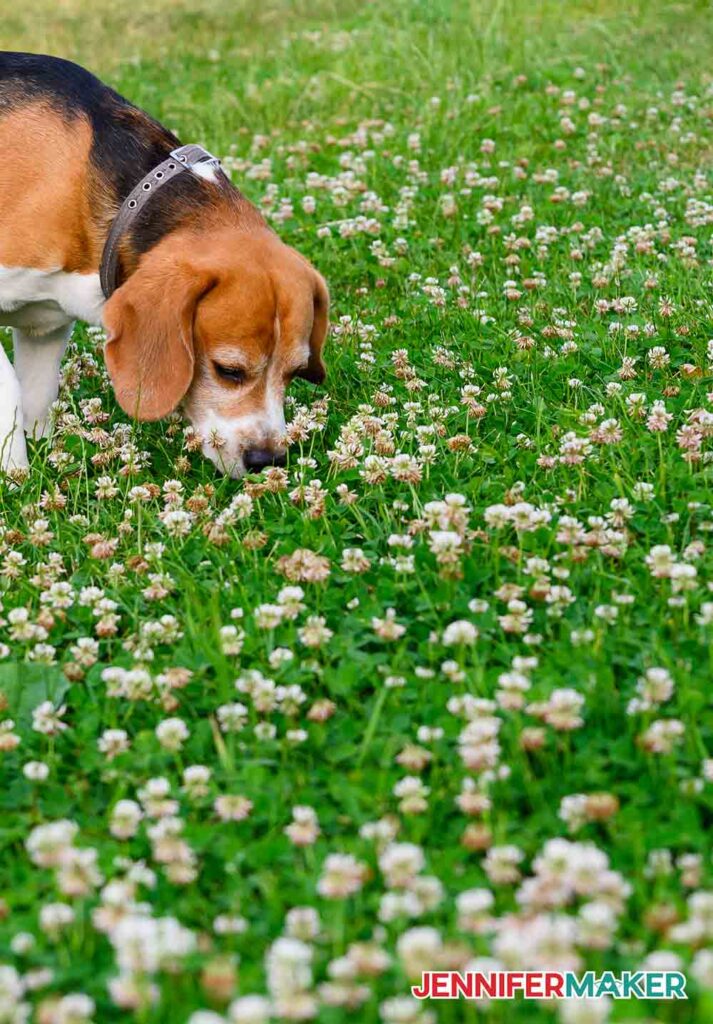
Clover in the Yard
Lawn Care and Clover Grass
Clover is often seen as a low-maintenance yard option, providing a lush lawn without the need for synthetic fertilizers. Clover is also known for its nitrogen-fixing abilities. Clover is also friendlier to pollinators. These are all good reasons to consider clover.
Natural vs. Chemical Fertilizers
Using clover as a natural boost of fertilizer is a better option compared to chemical fertilizers, which may contain toxic substances that are bad for our dog friends.
Clover Varieties and Ground Cover
Different clover varieties, from green clover to clover chips, can be mixed with perennial ryegrass to create a beautiful lawn safe for heavy foot traffic. We’re considering a mix of microclover and dwarf fescue for our clover lawn.
Our Conclusion
Is clover safe for dogs? We found that, yes, clover is mostly safe for dogs.
A small quantity of clover is harmless. That said, large amounts could lead to various health problems. Clover in the yard, as part of a proper diet, can be managed, but excessive clover consumption should be avoided. So if we notice our dogs grazing a lot in the yard, we will simply bring them back in. Our dogs are primarily house dogs, and don’t spend hours outside unsupervised, so we feel there is no issue here. Besides, we know we already have clover in our existing dog area, and have had it for years, without any harmful effects on our very healthy dogs!
Here’s our lawn at home with clover growing in it:
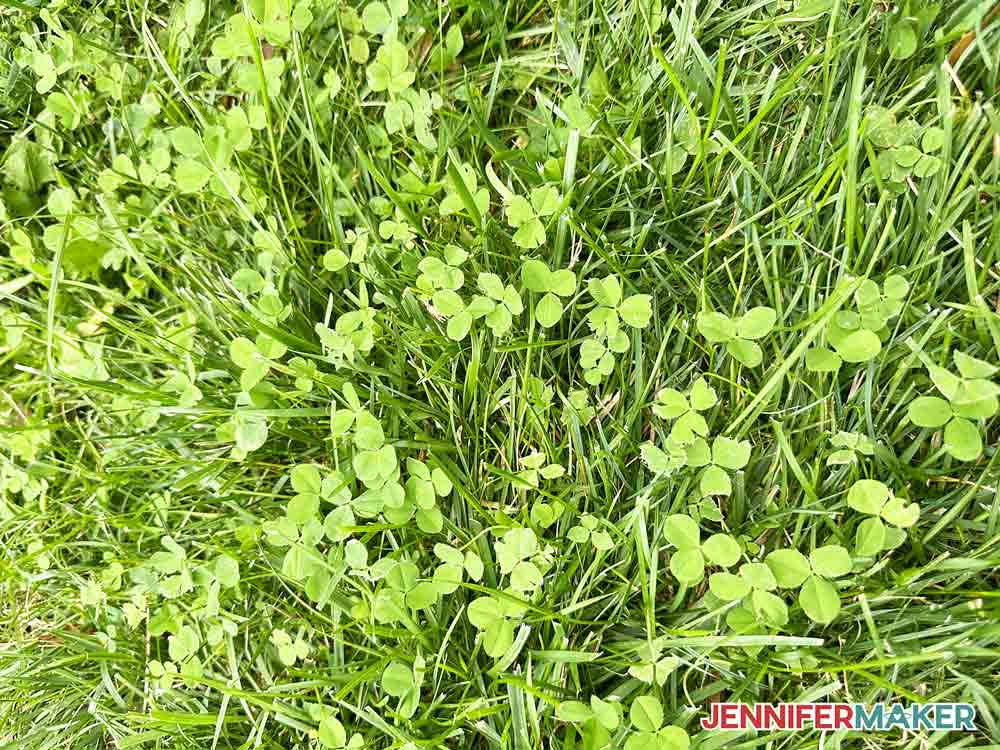
Now that we know clover is safe for our dogs, our plan is to get some miniclover and combine it with some grass seed to create a low-maintenance yard on our farm that doesn’t mind the sun! Watch for updates on how our clover grows!
Answers to Your Questions About Clover and Dogs
- Is red clover toxic to dogs? No, but if your furry friend consumes a lot of clover, it can be harmful.
- Can dogs eat clover? Yes, in small quantities. If your dog is going to town on the clover, bring him or her in to avoid temptation.
- What are the symptoms of clover poisoning in dogs? Symptoms may include upset stomach, kidney damage, oxalate poisoning, and skin irritation.
- How can I safely have clover in my lawn? Choose the right types of clover, like micro clover seed and grass lawns mixture, and avoid excessive chemical fertilizers. This will help maintain a clover lawn safe for your pets.
- Can clover cause allergies in dogs? Yes, clover flowers, and even clover sprouts can be a primary allergen for some dogs, leading to skin problems or food allergies.
- Does clover grass cause brown spots on lawns? Clover itself doesn’t cause brown spots, but dog urine might, especially if there’s too much clover in the lawn. The soluble calcium oxalate crystals in some dog’s urine can react with clover, causing spots. Typically, however, clover lawns are less likely to have dog urine issues than grass lawns.
- Are shamrock plants the same as clover? While they may look similar, shamrock plants are not the same as clover and may have different effects on dogs.
- Can I use clover as an herb in my dog’s food? Clover herb has some anti-inflammatory properties and blood-purifying properties, but you should consult with a local nursery or vet to make sure it’s safe for your dog’s diet.
- Is clover a good luck charm for dogs too? While clover is often seen as a good luck charm for humans, there’s no evidence to suggest the same for dogs. However, they might enjoy it as a tasty treat!
- How long does clover last? Most clovers, like the short-lived perennial varieties, will last for a long period of time in your lawn. Clover will go dormant in cold weather, then return again in the spring.
- Can dogs benefit from the vitamin C in clover? While clover does contain some vitamin C, it’s not in a significant amount to provide health benefits for your dog.
- How does clover affect the environment? Clover has a symbiotic relationship with certain bacteria, helping in atmospheric nitrogen fixation. This is beneficial for lawn grasses and helps in deeper roots development.
- Is it true that clover has anti-cancer agents? Some studies suggest certain clovers may contain anti-cancer agents, but there’s no conclusive evidence that it’s beneficial for dogs.
- How much clover is safe for dogs to eat? A small amount of clover is generally harmless, but large quantities or an excessive amount should be avoided. It’s always best to consult your vet for your specific dog’s needs.
- Can I grow clover in my dog run? Sure! Clover can be a low-maintenance option for a dog run, covering square feet with a beautiful mixture of grass and clover. Just be mindful of the United States’ local regulations regarding plant material.
We hope you found this guide to clover and dogs useful! Please let us know if you have any questions!
Love,
